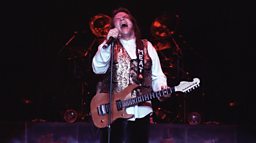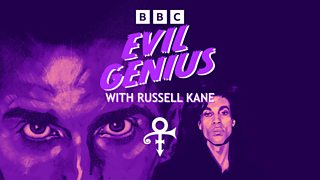Meat Loaf: Evil fiery tempered monster or genius monster hit-maker?
Was he the ultimate proponent of the power ballad, delighting millions of fans with his staggering voice? Or an angry weirdo with some very dodgy ideas about romance and viruses?
Each week on Evil Genius with Russell Kane, the great and good from the past are thoroughly probed by a gaggle of comedians to see if their deeds and personality mean they should be lionized or thoroughly despised.
We know that Meat Loaf will do anything for love (except that one thing), but were the things that he actually did do in his life reprehensible or sensible? It was up to Rachel Fairburn, Stevie Martin and Johnny Cochrane to pick though the evidence and render him either evil or genius.
Here’s what they heard…

For: He overcame adversity
Marvin Aday was dubbed Meat by his father after seeing his bright red, newly born son. A coach at school then added the ‘Loaf’ after Meat stood on his foot and the name stuck. But he had a turbulent childhood. He was frequently bullied about his size and weight. His mother died when he was young, and he was so traumatised he reportedly tried to pull her body out of the coffin. Then his alcoholic father attacked him with a butcher’s knife. Meat fought back, overpowered him, escaped the family home and never returned. He moved to Los Angeles, started a band and soon found fame and fortune. As Stevie says in this episode: “You’ve got to be forged in fire to be a rock god.”

Let’s be honest: no superstar will ever look like me again.Meat Loaf
Against: He had a fiery temper
Meat Loaf struggled with fame. After the huge success of Bat Out of Hell, he described himself as a ‘perfect monster’. He suffered breakdowns, admitted to substance abuse and left showbusiness for many years. Band members claimed he could be intense and would be more likely to throw a chair when frustrated than quietly fume. As Rachel explains on the show, after years of Meat’s rock star pampering, “it’s no wonder when he doesn’t get his own way, he’s like a petulant child.” Karla DeVito, who sang with him on stage, claimed he launched a microphone stand at her and once threw her offstage. Meat, who always considered himself more of an actor than singer (he appeared in many movies), insisted he was in character, so it wasn’t actually him doing the throwing.
For: He wasn’t a typical rock star
Russell describes Meat as “a lump of masculine energy from another planet.” Meat himself admitted, “Let’s be honest: no superstar will ever look like me again.” He was big and not that pretty, but the public loved his music. Bat Out of Hell was an astonishing success, becoming one of the biggest albums of all time and the sequel, Bat Out of Hell II, featured the massive hit I Will Do Anything For Love (But I Won’t Do That). This was despite Meat Loaf’s music being thoroughly derided by critics, with Melody Maker deciding that Meat and his crew were the worst rock and roll band in history. But Meat didn’t care. He defied convention and ploughed on. As Rachel states on the show: “There’s nothing wrong with lots of people liking what you do.”
Against: He wasn’t a conventional romantic
Meat recounted that by the age of 11 he was ‘making out’ with multiple schoolfriends, and claimed his raunchy songs were all based on personal experience. For reasons that are somewhat unclear, he proposed to his first wife by presenting her with a whole salmon. As Johnny points out on the podcast: “You’d probably want a little more romance than, ‘here’s a salmon, crack on’”. As well as getting thrown off stage, Karla DeVito has also stated that the way Meat kissed her during a particular song was a little over-zealous, saying, “the tongue in the mouth was not in the job description”. Ew.
For: He was a staggering performer
Meat threw everything into his performances, sometimes exuding so much energy on stage that he would later require oxygen. To him, his time in the spotlight was everything and he wanted to give 100% every time. Meat Loaf stated that he would ‘die’ for an audience and admitted that he would like to die on stage as ‘then I’m dying doing what I love’. As Stevie points out, it’s no surprise that “Nans to young people have a soft spot for Meat Loaf.”
He’s entitled to his opinion, even though I think it’s wrong.Rachel Fairburn
Against: He had some odd ideas
Russell describes Meat Loaf as a ‘walking contradiction’. Despite his name, for many years he was a vegetarian. He advertised a vegan pizza as he felt switching that from meat to veggies would help save the planet. But he was also a climate change sceptic. And he railed against Covid-19 restrictions and mask-wearing, though some outlets have reported that he died due to Covid complications (this is unsubstantiated). But as Rachel tells the podcast: “He’s entitled to his opinion, even though I think it’s wrong”.
So what did the panel decide? Was Meat Loaf a delectable dish or plate of old gristle? You’ll have to listen to the podcast to find out.
More from Βι¶ΉΤΌΕΔ Radio 4
-
![]()
Evil Genius: Prince
Olga Koch, Thanyia Moore and Johnny Cochrane uncover some truths about The Purple One.
-
![]()
Evil Genius: Freddie Mercury
Tom Allen, Evelyn Mok and Isma Almas share what Queen's singing superstar means to them.
-
![]()
Comedy of the Week
Brighten your week with the latest Βι¶ΉΤΌΕΔ Radio 4 comedy, introduced by Athena Kugblenu.
-
![]()
Friday Night Comedy
Download the best satirical comedy from Radio 4, every Friday. Features The News Quiz, The Now Show and Dead Ringers.





